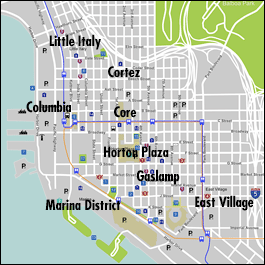Joe McLaughlin / Broker Associate
619-980-5101 joe@HomesofSanDiego.com
San Diego - Downtown Community
Click on an area of the below map to get more detailed information:

|
|
Core
The visual and physical center of downtown, Core was downtown’s business and entertainment quarter, with several grand theaters and old-style buildings. Throughout the last couple of decades, many old buildings have been renovated for new residential and commercial uses, drawing people into the neighborhood to live and work. Currently, Core serves as San Diego region’s government and corporate hub. Throughout the week and weekend the BroadwayandC Street’sare prime areas for daytime and nighttime activities.
Columbia
Though largely a commercial neighborhood, Columbia has stood witness to developments of all kinds. Over 1,800 residential units, 1,009,000 square feet of commercial space and hundreds of parking spaces have been in done in recent years. Columbia is also home to the San Diego Museum of Contemporary Art, the Federal and County courthouses, and the State Office Building. For the future the North Embarcadero Visionary Plan project is underway by the civic authorities to provide entertainment, dining, shopping, and increased access to the natural beauty of the downtown area.
Cortez Hill
One of San Diego’s oldest and distinguished residential neighborhoods, Cortez Hill is named after the historic El Cortez Hotel. The district is diverse along both sides of the Sixth Avenue. The Cortez Hill district affords views of urban San Diego, Balboa Park, the bay and Pacific Ocean. The intimate neighborhood feeling, varied housing, closeness to the downtown Core and Balboa Park, and waterfront and mountain views make Cortez Hill an enticing location. There are many new developments in the for front including 6,000 square feet of retail space, 800 residential units and the Cortez Hill Neighborhood Park.
East Village
East Village is San Diego’s largest and most rapidly developing neighborhood. Boosted by plans surrounding Petco Park, development has skyrocketed in this district, the last to be developed by the city.
This center of modern urban development is also San Diego’s arts district, spotted with artists’ homes, studios, galleries and shops. There are many projects for beautification, rehabilitation, employment opportunities, and the development of East Village as an arts and entertainment center. Former warehouses and other old buildings have been transformed into state of the art residential lofts. The New School of Architecture, San Diego City College and two high schools join this neighborhood’s youthful population.
Gaslamp Quarter
The Historic Gaslamp Quarter has become one of San Diego’s most popular neighborhoods, featuring an attractive blend of old and new buildings surrounded by day time and night time activity. This 16.5-block neighborhood is recognized on the National Register of Historic Places, and its 94 historically or architecturally significant structures now house more than 70 restaurants and nightclubs, movie theaters, shops, offices, galleries and lofts. Annual events such as Street Scene, the Mardi Gras Celebration, Taste of Gaslamp, and Cinco in the Gaslamp are held in this district, to the delight of San Diego area residents and visitors. Gaslamp nightlife is where you will find the pulse of Downtown entertainment 365 days out of the year.
Little Italy
Little Italy today represents some of the finest of San Diego living: bay views, fine food, art and cultural festivities, and affordable residences. Housing here offers an urban neighborhood with single-family homes, condominiums and apartments. Downtown Little Italy is alive with restaurants, small cafes, galleries and specialty shops. Little Italy hosts over half-a-dozen annual festivals in celebration of holidays, music and art, including Festa, "Chalk La Strada," a Bocce Ball Tournament, Art Walk, a jazz festival and Cinco de Mayo, St. Patrick’s Day, and Easter celebrations.





